The Daily Bulletin is published by Internal and Leadership Communications, part of University Communications
Contact us at bulletin@uwaterloo.ca
Submission guidelines
Editor:
Brandon Sweet
University Communications
bulletin@uwaterloo.ca
This article was originally published on Waterloo News.
If you feel more stressed than you did before the pandemic, you’re not alone. Despite high rates of vaccination and our deeper familiarity with COVID-19, Canadians are still anxious.
A deep dive into mental health survey data by researchers at the University of Waterloo shows that almost a quarter of Canadians are still reporting anxiety and suggests that the mental health impact of the pandemic might still be observed for a few years to come.
 Using survey data collected by the Mental Health Research Canada (MHRC), Gustavo Betini, a PhD student in the School of Public Health Sciences, and his supervisor, John Hirdes, are exploring the effect of the pandemic both on the population at large as well as on particular groups, from health-care workers, to the LGBTQ+ population, to students.
Using survey data collected by the Mental Health Research Canada (MHRC), Gustavo Betini, a PhD student in the School of Public Health Sciences, and his supervisor, John Hirdes, are exploring the effect of the pandemic both on the population at large as well as on particular groups, from health-care workers, to the LGBTQ+ population, to students.
Supported by a Mitacs grant, a national organization that connects agencies with academic researchers, the project aims to make even greater use of a MHRC survey that was sent out to between 3,000 and 4,000 Canadians every six to eight weeks since April 2020.
Overall survey data has revealed that anxiety levels have not changed significantly since December 2021, with around 23 per cent of Canadians indicating high anxiety and approximately 15 per cent indicating high depression.
“You might expect the stress would go down because we're used to this new reality, but it hasn’t,” says Betini, adding that economic concerns and the return to traditional workplaces may also be playing a part in the continued elevation. Not surprisingly, front line health-care sector workers experience the highest rates of mental health struggles, with 33 per cent reporting a diagnosis of anxiety.
Beyond the insights the data can provide into the general population, Betini says that over the past year, he’s been able to explore the pandemic’s effects on particular sectors, such as nurses or restaurant workers, geography (urban versus rural), ethnicity, income level, or specific survey questions.
For example, one question set delved into participants’ use of mental health services, revealing an increase from 11 to 22 per cent since the start of the pandemic. Yet another question reported that more than one in 10 Canadians felt they should be accessing mental health care, but are not, an insight with the potential for further exploration into why.
Sometimes requests to explore the effects on particular populations will come from partners such as Health Canada, and others will be based on the researchers’ own interests. As a student himself, one of Betini’s own curiosities was examining the effects on students. He’s set to release a paper on the anxieties felt by students from 16 to 24 years of age, and says he was surprised to find that it was not so much their student status but their age group that made younger adults more stressed. He’s currently studying the effects of the pandemic on mothers with young children and soon-to-be investigating levels of trust in the health-care system by different populations.
While Betini’s work was originally set to wrap up after a year, his contract has been extended and MHRC now has funding for three years. Betini says that he would like for his research to help inform public health decision making and that just having this data is a helpful record of Canadians’ experiences.
“My hope is for public health officials to understand what's happening and make decisions that help people.”

Members of student design team Warrior Home hope to repeat their success when they built an energy efficient home for an Indigenous family and took second place in a high-profile competition in 2021.
This article was originally published on Waterloo News.
A student design team at the University of Waterloo has been awarded US $50,000 to advance to the next stage of a high-profile competition to design and build energy efficient homes.
Warrior Home, which is made up of more than 50 students, many of them from engineering programs, was selected for funding in the Solar Decathlon Build Challenge, an event sponsored by the U.S. Department of Energy.
The team successfully presented its proposal for a net-zero retrofit of a century home in Kitchener to a jury of industry professionals at a recent event in Golden, Colorado.
The prize boosts the team’s fundraising efforts to $155,000. Other contributions have come from backers including Mattamy Homes, the Kitchener-Waterloo Association of Realtors and Waterloo Engineering.
Construction on the home is expected to begin in late summer or early fall in conjunction with the Kitchener-Waterloo Urban Native Wigwam Project, a non-profit housing group.
Thirteen other university teams also received funding to proceed with their projects, with seven more still working towards approval.
The two-year contest will culminate in the spring of 2023 when completed projects are judged. Universities in the running are from the U.S., Canada, India and Australia.
In the finals of the last competition in 2021, Waterloo Home took home second-place honours for an energy efficient house it designed and built for an Indigenous family on a reserve in the Owen Sound area.
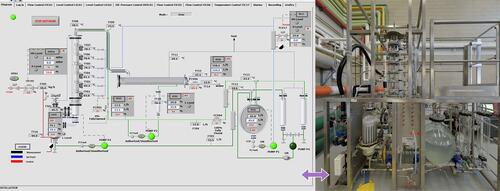
This article was originally posted on the Chemical Engineering website.
The Department of Chemical Engineering is proud to announce the creation of a modular, open educational resource (Distillation Laboratory) for deep learning of chemical engineering concepts. This resource allows users of all levels to explore, simulate, learn, and test their knowledge at their own pace.
As the world experienced the pandemic starting in early 2020, the University of Waterloo, like many other universities pivoted to remote teaching. University of Waterloo has been doing distance/online learning for over 50 years through the Centre for Extended Learning (CEL), with which the Department of Chemical Engineering has collaborated before the pandemic on various projects. Assessing the impact of the pandemic on student learning and experience, especially in a laboratory setting, three chemical engineering educators saw the opportunity to create a unique, experiential, and personalized learning approach that would benefit students and instructors around the world.
The industrial process of separation of a binary liquid mixture into its constituents is the quintessential application of chemical engineering concepts and a cornerstone of the training of undergraduate chemical engineering students in Canada and across the world. University of Waterloo’s Chemical Engineering Department has Ontario's only pilot-scale distillation column in one of its labs. In-depth exploration of this real-world process in a laboratory setting is typically reserved for students in the final year of study after a host of fundamental concepts and theoretical principles have been taught. The opportunity to learn these concepts and principles through reflection on “doing” is absent in this linear approach.
With funding from eCampus Ontario, Professors Eric Croiset and Marios Ioannidis and Senior Laboratory Instructor John Zhang set out to integrate a 360o virtual tour of their continuous distillation pilot plant with high-fidelity process simulation and multimedia. The result is an educational resource that permits versatile and interactive exploration of the content by students at various levels in the Chemical Engineering Program. Different elements (text, diagrams, embedded video, interactive knowledge checks, process simulation, virtual exploration of components and parts, and design exercises) combine to create an authentic learning experience that accommodates all learning styles.
To build this unique educational resource, the three chemical engineering authors relied on close collaboration with a large CEL team of professionals. While the core CEL team was composed of Antonina Joukova (Instructional Media Developer), Anisha Kuppa (Quality Assurance/LMS Specialist), and Felicia Pantazi (Online Learning Consultant), approximately 30 other people from CEL and other departments (ITMS Studio, Engineering Computing) were involved in the production (e.g., copyright specialist, usability/user experience assessment, AODA review, image description writers, videographer and video editor, panorama photographer, etc.)
Aldo Caputo, Director of CEL, said, "As we emerge from the pandemic, we will likely see greater use of digital learning strategies. Taking a team-based approach to the development of these resources will be critical, and this project is an excellent example of how that can be successful."
The effectiveness of the new educational resource is being investigated: a first survey of Chemical Engineering students– to be presented at the 2022 Canadian Engineering Education Association (CEEA-ACEG22) Conference - indicates that it significantly promotes deep learning in a fourth-year project-based laboratory.
Click here to explore the module.
This article was originally published on the Faculty of Environment website.
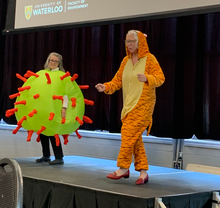 On Thursday May 12, 2022, the Faculty of Environment held the first in-person General Assembly in over two years. The assembly received an entertaining annual report presentation from all the departments, attributed to Dean Jean Andrey’s goal for a creative spin on the classic reports.
On Thursday May 12, 2022, the Faculty of Environment held the first in-person General Assembly in over two years. The assembly received an entertaining annual report presentation from all the departments, attributed to Dean Jean Andrey’s goal for a creative spin on the classic reports.
To kick off the event, the Advancement team presented their report in a game format, titled “What’s in the box”. Faculty members were chosen to identify objects in a covered box that represented the Faculty's accomplishments for the year. An example was Professor Marcus Moo’s attempt to identify a plane and clouds, and relate his identified objects to the Waterloo Institute for Sustainable Aeronautics (WISA).
Next, Dean Jean gave a captivating performance in her Tiger outfit about the activities of the Dean’s office as she argued with Faye Schultz, dressed as “covie”, the covid germ. The Dean’s outfit represented a Tiger’s calming nature as she assured her team that everything would be all right during the tough years of battling Covid-19.
The Associate Deans Graduate, Undergraduate, Research, and Strategic Initiatives all had their ups and downs in the past year.
The Graduate team had trouble organizing Teaching Assistants (TAs) and learning how to dance salsa but received amazing numbers with many scholarship recipients and grad events in the year.
Similarly, the Research team had taken a hit over these past few years in funding but enthusiastically presented their highest research funding year in a lively game of Jeopardy.
The Undergraduate team took the attendees on a bird-watching trip analogy to display the number of undergraduate students, including “migrants” that came to the nurturing shores of the Faculty of Environment this past Fall. However, “tyrant” birds were detected such as the mockingbird, seen to be copying other students’ materials.
The Strategic Initiatives team raised the bar this year. They presented the new Future Cities program. With six students, it is a slow but steady start to launching the new initiative.
In addition, each department gave a creative report starting with the Department of Geography & Environmental Management (GEM) that put together an artistic video which showed the life of a GEM student and their incredible adventures.
The Department of Knowledge Integration gave a detailed report on how integrative their students can be, and other interdisplinary partnerships. They ended their presentation with a rhyme thanking the Dean for everything she has made possible.
In their presentation, the School of Environment, Enterprise and Development (SEED) team hosted an informative talk show where they went over a variety of subjects, including Environment 3's innovative flood-risk management system – a pilon.
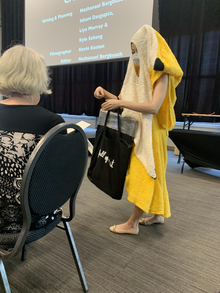 The students and staff of the School of Environment, Resources, and Sustainability (SERS) produced an enlightening and hilarious skit that ended with the department's mascot, the Big Banana, making an appearance to present a farewell gift to the Dean.
The students and staff of the School of Environment, Resources, and Sustainability (SERS) produced an enlightening and hilarious skit that ended with the department's mascot, the Big Banana, making an appearance to present a farewell gift to the Dean.
The School of Planning displayed their data by going through reviews of its program which was rated an overall 4.4 out of five stars.
Finally, the Mapping, Analysis & Design (MAD) team ended their presentation with a very original rendition of YMCA, using the acronym, Mapping, Analysis, Ecology, Design (MEAD) representing the collaboration of the Ecology Lab and the MAD team.
The General Assembly was a great success, interesting and engaging all through the event. Professor James W.E. Rush, vice-president, Academic and provost, and Professor Lili Liu, dean, Faculty of Health were part of the guest attendees to this year’s event.
All the reports for the 2022 General Assembly can be accessed here.
The video of last week's President's Forum has been uploaded to the President's website. The site also includes questions posed at the forum as well as answers from the University's senior leadership.
If you missed the forum, you can watch it on YouTube:
Employers hosting Virtual Employer Information Sessions (VEIS) this week and for the upcoming week include BlackBerry Canada and SPS Commerce. Make sure to register through WaterlooWorks and check the calendar for any updates.
Graduate Studies and Postdoctoral Affairs (GSPA) will host a virtual event “A community of scholars: celebrating spring 2022 PhD graduates.” on Thursday, May 26 from 4:00 – 5:00 p.m. (EST) in addition to the convocation ceremonies in June. The event will feature remarks from senior University leadership and the Governor General Gold Medal doctoral students. Doctoral graduate students, supervisors and guests are welcome to register to attend.
The deadline to apply to Speak Like a Scholar is Friday, May 27. Develop your professional scholarly voice and learn to give effective academic presentations with confidence. Open to Master's and PhD students. Apply on the Writing and Communication Centre website.
Students can visit the Student Success Office online for supports including academic development, international student resources, immigration consulting, leadership development, exchange and study abroad, and opportunities to get involved.
Instructors looking for targeted support for developing online components for blended learning courses, transitioning remote to fully online courses, revising current online courses, and more please visit Agile Development | Centre for Extended Learning | University of Waterloo (uwaterloo.ca).
Instructors can visit the Keep Learning website to get support on adapting their teaching and learning plans for an online environment.
Course templates are available within your course in LEARN to help you build and edit your content and assignment pages quickly.
The following workshops, webinars, and events are offered by the KL team (CTE, CEL, ITMS, LIB):
Supports are available for employees returning to campus. Visit IST’s Hybrid Work and Technology guidelines and workplace protocols to assist with the transition.
The Writing and Communication Centre has virtual services and programs to help undergrads, grad students, postdocs and faculty members with academic writing.
Co-op students can get help finding a job and find supports to successfully work remotely, develop new skills, access wellness and career information, and contact a co-op or career advisor.
The Centre for Career Action (CCA) has services and programs to support undergrads, grad students, postdocs, alumni, and employees in figuring out what they value, what they’re good at, and how to access meaningful work, co-op, volunteer, or graduate/professional school opportunities. Questions about CCA's services? Live chat, call 519-888-4047, or stop by our front desk in the Tatham Centre 8:30 a.m. to 4:30 p.m., Monday to Friday.
Drop-in to Warrior Virtual Study Halls on Wednesdays from 5:30 p.m. to 7:00 p.m. Come together in this virtual space to set goals and work independently or in groups each week.
Renison's English Language Institute continues to offer virtual events and workshops to help students practice their English language skills.
If you feel overwhelmed or anxious and need to talk to somebody, please contact the University’s Campus Wellness services, either Health Services or Counselling Services. You can also contact the University's Centre for Mental Health Research and Treatment. Good2Talk is a post-secondary student helpline available to all students.
The Library is open with expanded hours for access to book stacks, drop-in individual study space, bookable group study rooms, drop-in access to computers and printers, book pick-up services and IST Help Desk support. Librarian consultations, Special Collections & Archives and the Geospatial Centre are available by appointment. Full details on current services and hours are available on the Library’s COVID-19 Update webpage.
The Faculty Association of the University of Waterloo (FAUW) continues to advocate for its members. Check out the FAUW blog for more information.
The University of Waterloo Staff Association (UWSA) continues to advocate for its members. Check out the UWSA blog for more information.
The Sexual Violence Prevention and Response Office (SVPRO) supports all members of the University of Waterloo campus community who have experienced, or been impacted, by sexual violence. This includes all students, staff, faculty and visitors on the main campus, the satellite campuses, and at the affiliated and federated Waterloo Institutes and Colleges. For support, email: svpro@uwaterloo.ca or visit the SVPRO website.
The Office of Indigenous Relations is a central hub that provides guidance, support, and resources to all Indigenous and non-Indigenous campus community members and oversees the University's Indigenization strategy.
The Waterloo Indigenous Student Centre, based at St. Paul’s University College, provides support and resources for Indigenous students, and educational outreach programs for the broader community, including lectures, and events.
WUSA supports for students:
Peer support - MATES, Glow Centre, RAISE, Women’s Centre - Visit https://wusa.ca/services/wusa-peer-support to book an appointment either in person or online for the Fall term.
Food Support Service food hampers are currently available from the Turnkey Desk 24/7 in the Student Life Centre. Drop off locations are also open again in SLC, DC, DP, SCH and all residences.
Co-op Connection all available online. Check https://wusa.ca for more details.
Centre for Academic Policy Support - CAPS is here to assist Waterloo undergraduates throughout their experience in navigating academic policy in the instances of filing petitions, grievances and appeals. Please contact them at caps@wusa.ca. More information is available.
WUSA Student Legal Protection Program - Seeking legal counsel can be intimidating, especially if it’s your first time facing a legal issue. The legal assistance helpline provides quick access to legal advice in any area of law, including criminal. Just call 1-833-202-4571.
Empower Me is a confidential mental health and wellness service that connects students with qualified counsellors 24/7. They can be reached at 1-833-628-5589.
GSA-UW supports for graduate students:
The Graduate Student Association (GSA-UW) supports students’ academic and social experience and promotes their well-being.
Advising and Support - The GSA advises graduate students experiencing challenges and can help with navigating university policies & filing a grievance, appeal, or petition.
Mental Health covered by the Health Plan - The GSA Health Plan now has an 80 per cent coverage rate (up to $800/year) for Mental Health Practitioners. Your plan includes coverage for psychologists, registered social workers, psychotherapists, and clinical counselors.
Dental Care - The GSA Dental Plan covers 60 to 70 per cent of your dental costs and by visiting dental professionals who are members of the Studentcare Networks, you can receive an additional 20 to 30 per cent coverage.
Student Legal Protection Program - Your GSA fees give you access to unlimited legal advice, accessible via a toll-free helpline: +1-833-202-4571. This advice covers topics including housing disputes, employment disputes, and disputes with an academic institution.
The Graduate House: Open Monday to Tuesday 11:30 a.m. to 7:00 p.m. and Wednesday to Friday 11:30 a.m. to 9:00 p.m. We’re open to all students, faculty, staff, and community members. The Graduate House is a community space run by the GSA-UW. We’re adding new items to the menu. Graduate students who paid their fees can get discounts and free coffee.
Warriors vs. Laurier Blood Donation Battle. Join our “Waterloo Warriors” team on the Blood.ca website or app. #ItsInYouToGive
Equity and inclusion in industry sponsored contract research and commercialization consultations for researchers, Monday, May 9 to Friday, May 27 Friday, June 3. Sign up for an interview timeslot. Please note the extension to June 3.
Master of Business, Entrepreneurship and Technology – Information Sessions, Wednesday, May 25, 10:00 a.m. (full-time program) and 5:00 p.m. (part-time program), online webinars.
"Machine learning meets system designs: Experience with designing learned cache systems" lecture featuring Professor Kai Li from Princeton. Wednesday, May 25 at 11:00 a.m. on Zoom.
Online Workshop: You Don’t Know What You Don’t Know Part 1, Wednesday, May 25, 1:00 p.m. to 4:00 p.m. Register now.
Continuous Improvement Showcase, Thursday, May 26, 9:00 a.m. to 12 noon, Federation Hall.
Getting Ready to Facilitate Online Courses: TA Training – Spring 2022, Monday, May 30 to June 24 (online certificate course). Register on GoSignMeUp.
On this week's list from the human resources department, viewable on the UWaterloo Talent Acquisition System (iCIMS):
Secondments/Internal temporary opportunities
Affiliated and Federated Institutions of Waterloo opportunities
The Daily Bulletin is published by Internal and Leadership Communications, part of University Communications
Contact us at bulletin@uwaterloo.ca
Submission guidelines
The University of Waterloo acknowledges that much of our work takes place on the traditional territory of the Neutral, Anishinaabeg, and Haudenosaunee peoples. Our main campus is situated on the Haldimand Tract, the land granted to the Six Nations that includes six miles on each side of the Grand River. Our active work toward reconciliation takes place across our campuses through research, learning, teaching, and community building, and is co-ordinated within the Office of Indigenous Relations.